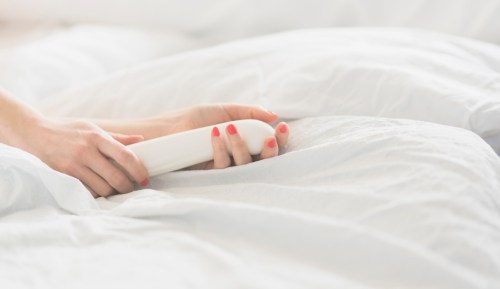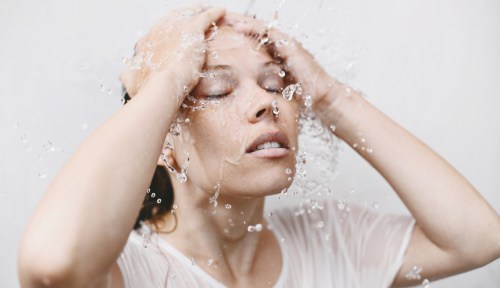Our editors independently select these products. Making a purchase through our links may earn Well+Good a commission
My mother masturbates. She’ll smack me on the shoulder when she sees this, but I’ll say the same thing to her then as I say to you now: It’s the truth. My family is Mexican and Catholic, and growing up, we just didn’t talk about sex—but lately, that’s changed. But, even though I know my 58-year-old mom sometimes experiences vaginal drynessamid menopause, I was worried about what she’d say when I asked her to test and pick the best lube for vaginal dryness. To my surprise, she was 100 percent down.
Experts in This Article
staff sexologist and educator at Good Vibrations
board-certified OB/GYN and certified menopause provider
To be absolutely sure, experiencing vaginal dryness is completely normal, says sexologist and pleasure activist Carol Queen, PhD. “Many things affect vaginal lubrication, and it’s completely natural for lubrication levels to fluctuate,” Queen says. “This is nothing anyone should feel self-conscious about. At all.”
The best lubes for vaginal dryness, at a glance:
- Best for menopause: Stripes Oh My Glide Intimate Play Oil, $36
- Best water-based: Playground After Hours Lubricant, $20
- Best oil-based: Bloomi Delight Oil-Based Personal Lubricant, $15
- Best silicone-based: Jo Classic Hybrid Personal Lubricant, $22
- Best organic: Sliquid Organics Natural Lube, $15
- Best for vaginal dryness: Lola Personal Lubricant, $10
- Best drugstore: K-Y Jelly Classic Water-Based Personal Lube, $5
- Best on Amazon: #LubeLife Hybrid Lubricant, $13
My mom tried a total of three, because she’s not a sex or masturbation machine, and I tapped a sexologist and gynecologist to round out the list.
Keep reading to learn what causes vaginal dryness, what to look for in these lubes, and the eight best lubes for vaginal dryness—vetted by an OB/GYN, a sexologist, and my 58-year-old momma.
What causes vaginal dryness?
“Vaginal dryness is par for the course after menopause and even in perimenopause,” says Jacqueline Sanchez, MD, a board-certified OB/GYN and nationally certified menopause practitioner. This happens, adds Dr. Sanchez, because of reduced estrogen levels. Menopause is a very common cause of vaginal dryness, but it’s far from the only one.
In fact, according to Mayo Clinic, there are a dozen reasons why you might experience vaginal dryness. For instance, breastfeeding, smoking cigarettes, and immune disorders can also all lead to someone experiencing vaginal dryness symptoms. “The most common symptoms are irritation, burning, and itching,” says Dr. Sanchez. “You can also have burning on urination, urinary urgency, recurrent urinary tract infections, and painful intercourse,” Dr. Sanchez adds.
If your vaginal dryness becomes unbearable or concerning, it’s best to consult your OB/GYN.
What can help with dryness?
A one-word answer: lube! Also known as personal lubricants and personal moisturizers, lubes come in all shapes and sizes. Or, more specifically, they come in different bases. You can take your pick from water-based lubes, oil-based lubes, silicone-based lubes, and even hybrid lubes, which combine water with either oil or silicone.
While some lubes might be marketed for menopause, there aren’t any lubes that are formulated particularly for vaginal dryness. “In my practice, I don’t recommend particular lubricants for women who are postmenopausal. Postmenopausal women can use the same lubricants that anyone can use during self-pleasure or sexual intimacy,” says Dr. Sanchez.
Thinking about whether or not you can use coconut oil as lube? Great minds think alike, and we had that same question. While there isn’t an empirical study to prove it, OB/GYNs recommend not using coconut oil as a natural lubricant for female dryness. The reason? It may disrupt your vagina’s pH and even render condoms futile.
What to look for in a vaginal dryness lube (and how to use it)
Dr. Sanchez and Queen couldn’t have given more similar answers if they got together to rehearse them. “I would generally suggest water-based lubes, which are safe with latex condoms, though oil-based lubes do have fans,” says Queen. “Botanical ingredients, like aloe vera, may be great—unless you’re sensitive to them. If any ingredient in a lube bothers you, discontinue use and avoid that in the future.”
According to Dr. Sanchez, “As a general rule, I recommend avoiding lubricants with artificial flavors, fragrances, parabens, phthalates, essential oils, and glycerin because you never know when you you will have a reaction to these additives,” she says. “On the other hand, there are three types of lubes: oil based, water based, and silicone based. Depending on your specific needs, you should be choosing them wisely.” Dr. Sanchez, like Queen, typically recommends a “water-based lube because you can use them both with condoms and sex toys.”
As far as how to use the lube: Most will come with instructions, like “apply liberally” or “apply as desired” to your intimate areas. So long as all parties are consenting, there really isn’t a wrong way to use a personal lubricant.
8 best lubes for vaginal dryness
Best for menopause:
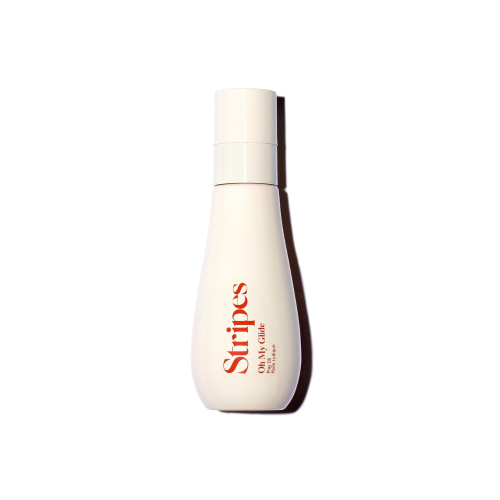
Stripes Oh My Glide Play Oil — $36.00
This brand, which caters to menopausal and perimenopausal women, was founded by actress Naomi Watts. “I created Stripes because we deserve support, solutions, and the space to figure it all out,” writes Watts on the brand’s Our Story page. With the Oh My Glide lube, you get that mission in a bottle, metaphorically speaking. In actuality, you get 3.3 ounces of Stripes’ best-selling oil-based lube. An important PSA: Oil-based products aren’t safe to use with latex condoms and may erode your silicone sex toys. To err on the side of caution, stick to oil-based lubes when you’re masturbating with your hand or having safe and consensual unprotected sex.
My amá (Spanish slang for mom) tells me she appreciated this personal lubricant when she tried it out. “I noticed that when I used this, it was a little oily for me, but it didn’t feel bad,” she says. “What I liked the most is that, the next day, it felt like I had no dryness at all,” she says.
Pros:
- Designed for menopause and perimenopause
- Long-lasting
- Recyclable
Cons:
- Not compatible with latex condoms
- A little on the oily side
Best water-based:
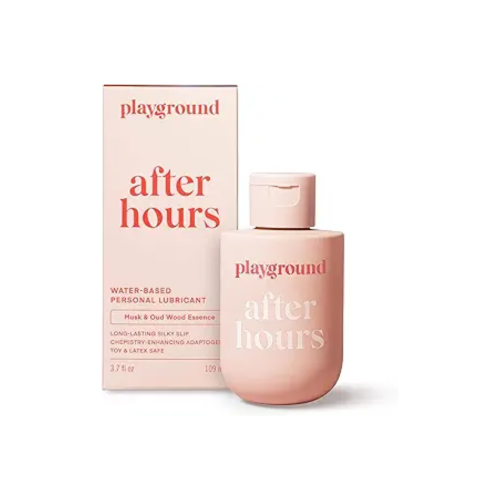
Playground After Hours Lubricant — $20.00
Like a bouquet of different spring flowers, there’s a lot to love about this water-based lube. Firstly, since it’s water-based, it’s safe to use with latex and polyisoprene condoms. Secondly, it’s pH-balanced and plant-based. Lastly, you get a solid 3.7 ounces for $25. While that may seem a little steep, a little of this lube goes a long way—and it smells fantastic, like musk and smoky oud wood.
“I like that it’s not oily and that it’s slimy to the point where it almost feels natural,” says my mom. In part, that’s because of the vitamin E and hyluronic acid, which both provide a silky and slippery experience. While we can’t say enough good things about After Hours, it’s worth explicitly noting that this product contains fragrance. If you’re sensitive to that in other products, like lotion or cleansers, you should probably avoid them in your lube, too, and maybe go with a lube for sensitive skin.
Pros:
- Formula is pH-balanced
- Compatible with condoms
- Subtle yet sultry scent
Cons:
- Fragrance may irritate sensitive skin
Best oil-based:
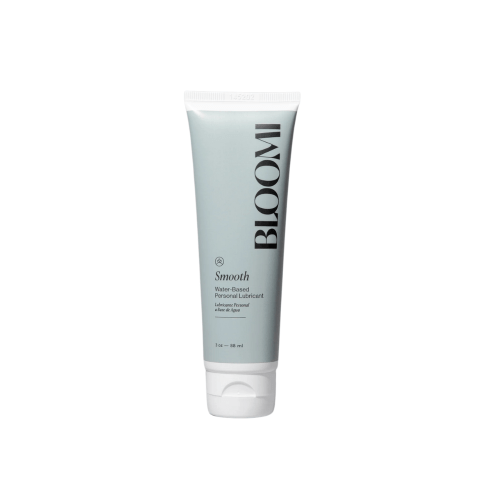
Bloomi Delight Oil-Based Personal Lubricant — $15.00
I am a huge supporter of Bloomi and will be until I die, honestly. Their products are top-notch, as they’re always formulated with body-safe ingredients and without glycerin, gluten, phthalates, sulfates, parabens, alcohol, artificial dyes, and synthetic fragrances. This oil-based lube might not have been made to relieve menopausal dryness, but it does that nonetheless. For that, we can thank the ingredients list, which contains sunflower seed extract and shea butter.
The three-ounce earthy brown bottle is actually more of a tube, which you squeeze to get the product out. I’ve tried Bloomi’s Smooth Water-Based Personal Lubricant and can attest that it’s not sticky nor does it dry out easily.
Pros:
- Extremely long-lasting
- Moisturizing
Cons:
- Not compatible with all types of condoms and sex toys
- May stain sheets
Best silicone-based:
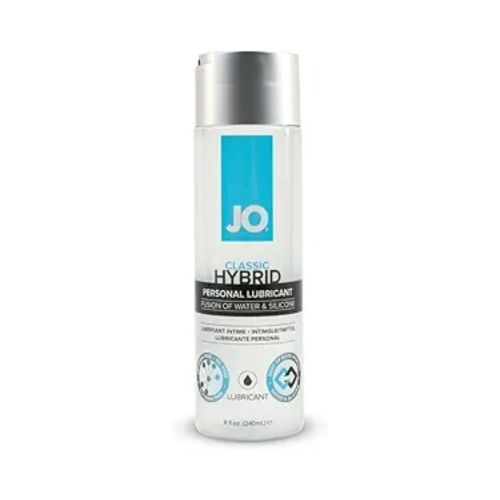
Jo Classic Hybrid Personal Lubricant — $22.00
Hybrid lubes are mixes of silicone or oil bases and water bases, with the latter making up most of the composition. However, the bit of silicone in a given formula makes it more slippery and longer-lasting. And that’s exactly what you get with Jo Classic Hybrid Personal Lubricant. What’s great about this lube is that it’s available in four sizes—one, two, four, and eight ounces—that it’s water-resistant, and that it’s fragrance-free. Additionally, since it’s silicone-based instead of oil-based, clean-up is a breeze.
Pros:
- Available in four sizes
- Silicone- and water-based
- Fragrance-free
Cons:
- Not compatible with silicone toys
- Not compatible with condoms
Best organic:
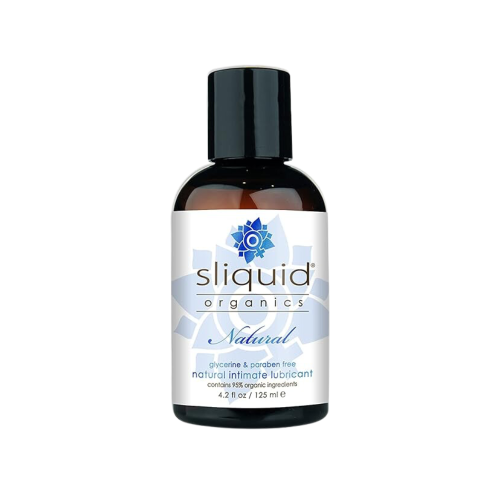
Sliquid Organics Natural Lube — $15.00
It’s completely acceptable to want to only give your special areas the very best. If we eat organic fruits and veggies because we’re careful what we put in our body, shouldn’t we also check what we put on our body? If that sounds like your jam, meet the Sliquid Organics Natural Lube, my favorite organic lube. The 8.5 ounces of water-based, glycerin- and paraben-free lube you get are A1. The formula contains 95 percent organic ingredients, so it’s a great choice for folks with sensitive skin.
Queen says she loves “that it contains vitamin E” as well as the fact that “this lube uses botanicals, including cellulose, for thickening.” She adds that she’s a fan of Sliquid as a brand. “While they don’t aim for menopausal users specifically, this can be a good choice for menopause-related dryness as well as general use.” There isn’t much slander to stick to the Sliquid lube, but if I’m nitpicking: the bottle isn’t exactly the most aesthetic of the bunch.
Pros:
- Contains 95 percent organic ingredients
- Bottle contains a lot of product
- Fragrance-free
Cons:
- Bottle is a bit bulky
Best for vaginal dryness:
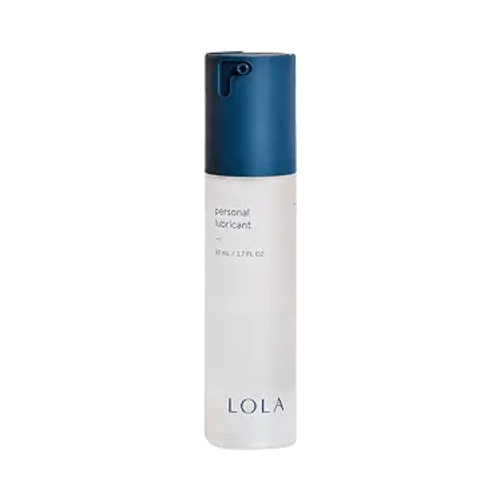
Lola Personal Lubricant — $10.00
“This one is my personal favorite. I’m really impressed by the ingredients list,” says Dr. Sanchez. “It’s water-based, hypoallergenic, and doesn’t have artificial additives. These are the types of products that I recommend most at my practice,” she adds. The price is right here, with a tag of $14 for 1.7 ounces of this water-based lube. The formula is sans bad-for-you ingredients like synthetic flavors and colors. Plus, it’s pH-balanced and the bottle has a one-handed pump as well as a locking mechanism.
My mom also tried Lola’s personal lubricant. “I love it because it doesn’t leave you sticky and it instead gets absorbed so that it’s more refreshing than anything,” she says. “Even the next day, I felt less vaginal dryness.” (Love that for her, tbh.)
Pros:
- No additives
- Long-lasting
- Fragrance-free
Cons:
- Only one size option
Best drugstore:
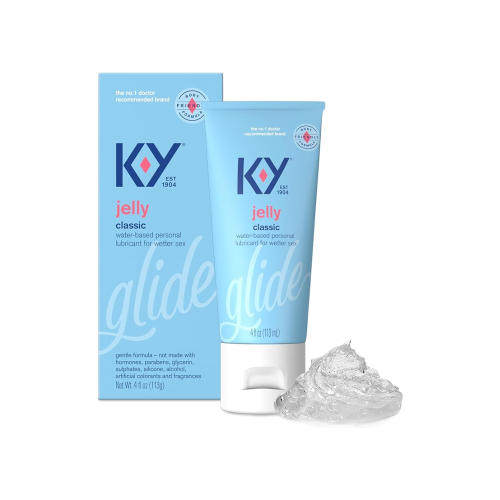
K-Y Jelly Water-Based Personal Lube — $5.00
Longtime fans of KY Jelly will notice that the water-based formula has changed. For instance, there are far fewer ingredients in this and the consistency is thinner. In the two-ounce tube, you’ll get a personal lubricant that’s water-based and anal-safe. This is one of the products Dr. Sanchez recommends to her patients. “I just mention ones that I know I like, like KY Jelly,” says Dr. Sanchez.
Pros:
- Compatible with condoms and most sex toys
- Available at drugstores
- Fragrance-free
Cons:
- Some reviewers say it becomes tacky
Best on Amazon:
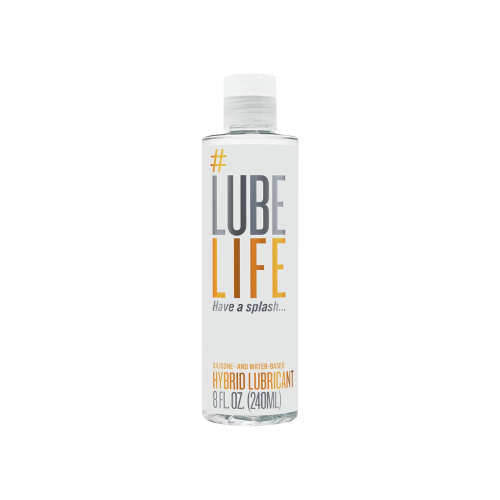
#LubeLife Hybrid Lubricant — $13.00
As open as I am about my sexuality, sometimes I don’t really want to be seen holding lube at the drugstore. Sometimes, I’d rather privately purchase my personal lubricant from the comfort of my own home. And that’s why I know that #LubeLife is the best the internet—or, at least, Amazon—has to offer. A couple of highlights: the formula is without parabens, glycerin, and oil. Also, since it has a silicone and water base, it’s extremely slippery. This is definitely the most affordable options, since you get eight ounces of this lube for $13.
Pros:
- Paraben-, glycerin-, and oil-free
- A lot of product
- Long-lasting
Cons:
- May stain linens
Sign up for the Well+Good SHOP Newsletter
Get exclusive deals on wellness, beauty, fitness, and food products that have been hand-picked by our editors.
Got it, you've been added to our email list.


